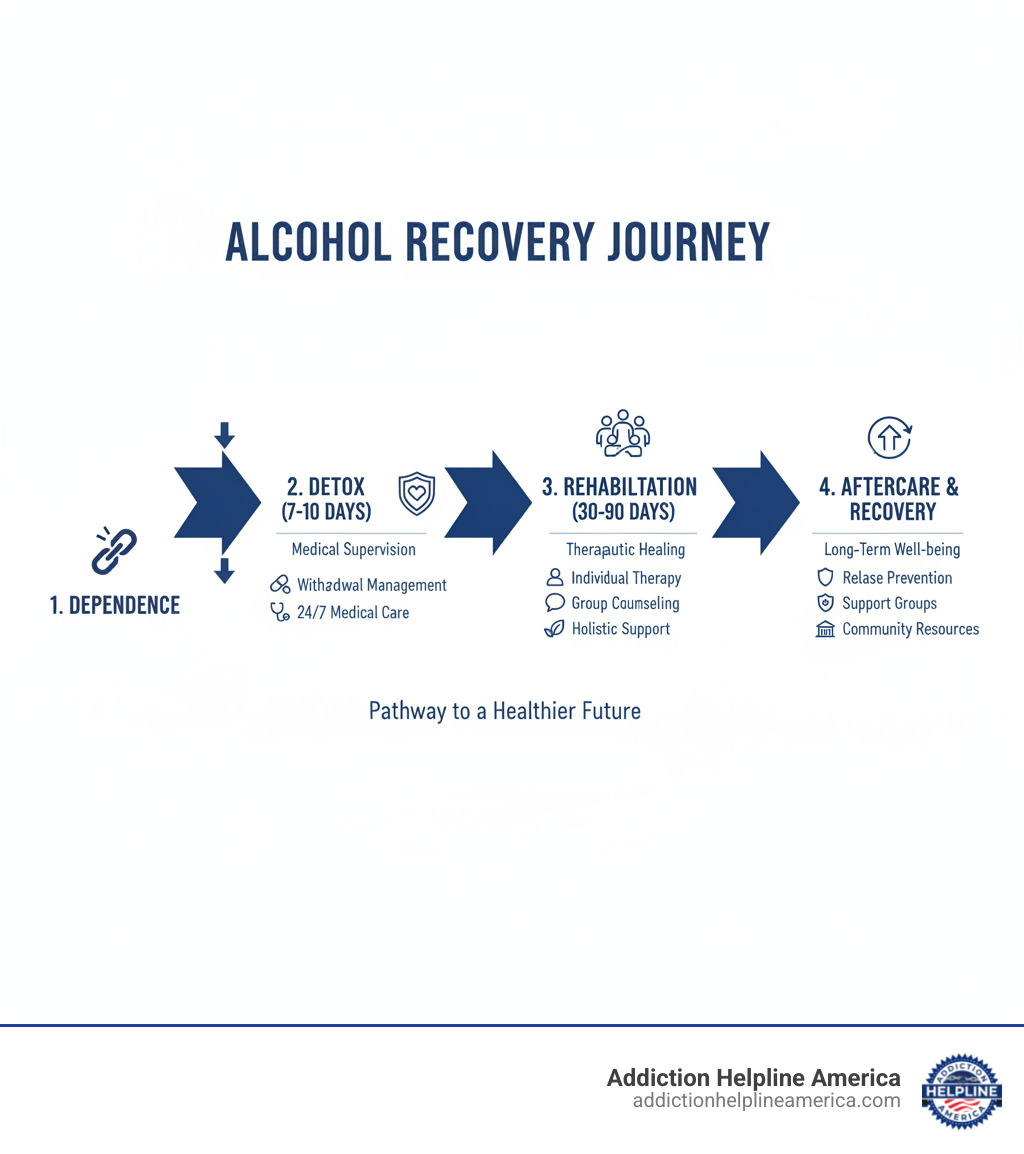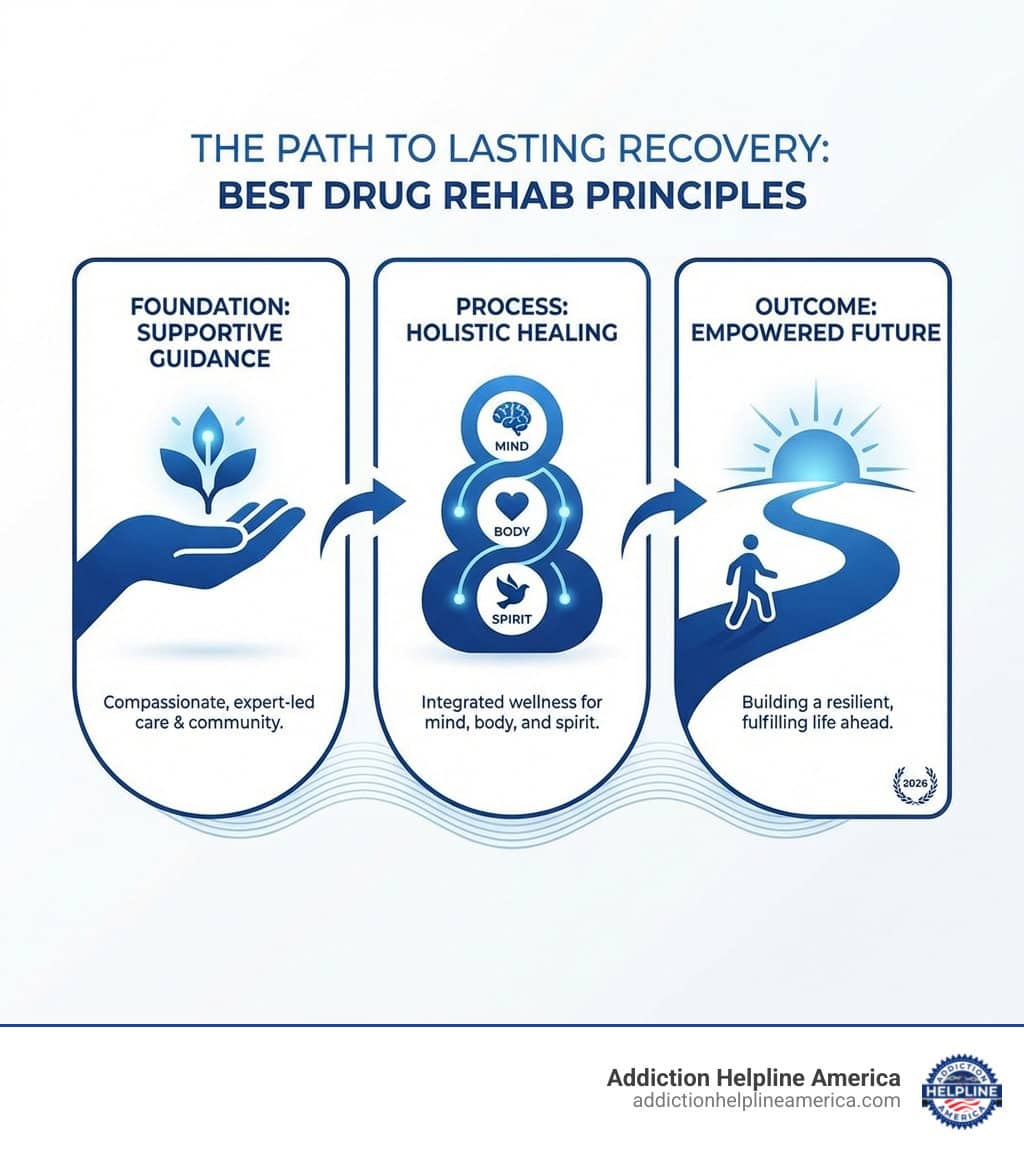
Why Finding the Right Alcohol Detox Treatment Centers Matters
Alcohol detox treatment centers offer medically supervised withdrawal management for individuals with alcohol dependence. These facilities provide 24/7 medical care and medication to ease withdrawal symptoms, creating a safe foundation for recovery over a typical 7-10 day stay.
What to look for when choosing an alcohol detox center:
- Accreditation and Licensing: Ensures the facility meets safety and quality standards.
- 24/7 Medical Supervision: Access to doctors and nurses is critical for managing complications.
- Evidence-Based Treatment: Proven methods like medication-assisted treatment (MAT) are used.
- Individualized Care: Personalized plans that may include dual diagnosis treatment for co-occurring mental health disorders.
- Aftercare Planning: A clear plan for the next steps in recovery is established before discharge.
If you’re struggling with alcohol dependence, taking the first step can feel overwhelming. Alcohol withdrawal is dangerous and can be life-threatening without medical support. Detoxification in a professional setting is the necessary first step, providing a safe environment for your body to stabilize. Medically supervised detox significantly reduces the risk of complications like seizures while making withdrawal more manageable.
At Addiction Helpline America, we connect individuals and families with accredited alcohol detox treatment centers that fit their specific needs. This guide will walk you through the entire process, from understanding detox to preparing for a life of sobriety.

Understanding Alcohol Detox: The First Step to Recovery
When your body is dependent on alcohol, quitting requires a safe path forward. Alcohol detox treatment centers provide the medical care and supervision that can save your life during the critical first days of withdrawal. Detox is the essential bridge from active addiction to lasting recovery.
What is Alcohol Detox?
When heavy drinking stops, the body can go into a dangerous state of shock. Alcohol detox is the medically supervised process of safely withdrawing from alcohol. It’s not just about stopping; it’s about managing what happens when you stop. Professional centers provide 24/7 monitoring and medications to ease symptoms and prevent complications. The goals are to keep you medically stable, manage acute withdrawal, and prepare you for the next phase of recovery. Detox addresses physical dependence, clearing the way for the therapeutic work of long-term rehabilitation.
Signs You or a Loved One Needs Professional Detox
Professional help is likely needed if you notice these warning signs:
- Inability to control drinking: You intend to have one or two drinks but can’t stop.
- Experiencing withdrawal symptoms: You feel shaky, anxious, or sick when you cut back or stop.
- Failed attempts to quit: You’ve tried to stop on your own but can’t, often due to unbearable withdrawal.
- Neglecting responsibilities: Alcohol takes priority over work, family, or other commitments.
- Continued use despite negative consequences: You keep drinking even as your health, relationships, or legal status suffers.
If you see these signs in a loved one, helping them find professional detox is a crucial step.
The Dangers of Alcohol Withdrawal and How Centers Manage Them
Alcohol withdrawal is one of the few substance withdrawals that can be fatal, which is why at-home detox is so risky. Without alcohol, the central nervous system becomes hyperactive, leading to severe physical symptoms like tremors, sweats, racing heart, and nausea. Psychological symptoms can include crushing anxiety, agitation, and terrifying hallucinations.
The most dangerous complications include:
- Delirium Tremens (DTs): A medical emergency that can occur 2-4 days after the last drink, involving confusion, high blood pressure, fever, and hallucinations.
- Seizures: A life-threatening risk that usually occurs within 6-48 hours of stopping.
Alcohol detox treatment centers manage these risks with 24/7 medical supervision to monitor vital signs and spot warning signs early. Medication-assisted treatment (MAT), typically using benzodiazepines, calms the nervous system to prevent seizures and reduce withdrawal severity. Staff also provide IV fluids and nutritional supplements to address dehydration and deficiencies. The National Institute on Alcohol Abuse and Alcoholism provides extensive scientific research on alcohol use disorder explaining these risks.
The Medically Supervised Detox Process
Walking into a detox center begins with an initial assessment to review your drinking history, overall health, and risk factors. This information is used to create a personalized individualized treatment plan.
During the stabilization phase, your body withdraws from alcohol under the care of doctors, nurses, and pharmacists. They administer medications, monitor your vitals, and provide support. The typical duration is seven to ten days, though this can vary. Nutritional support with balanced meals and vitamins helps your body heal, preparing you for the next stage of recovery.
Call Now – Your Journey to Recovery Begins Today!

Take the first step towards a healthier life! Call now to connect with our compassionate team and start your recovery journey today. Your path to healing awaits!
Our recovery specialists are available 24/7 to provide support, and all calls are confidential and free. Reach out anytime – we’re here to help!
Types of Alcohol Detox Programs
Not all alcohol detox treatment centers are the same. Understanding the different levels of care and approaches will help you find the right fit for your recovery journey.
Inpatient vs. Outpatient Detox
The main choice is between inpatient (residential) and outpatient detox. Inpatient care provides the highest level of supervision, while outpatient offers more flexibility.
Inpatient detox means you live at a facility 24/7, typically for about a week. This is ideal for those with severe alcohol dependence, a history of dangerous withdrawal symptoms (like seizures), or co-occurring health issues. The structured, trigger-free environment allows you to focus completely on getting through withdrawal safely.
Outpatient detox allows you to live at home and attend scheduled appointments at a clinic for medical monitoring and medication. This option works well for people with mild to moderate dependence who have a stable, supportive home environment and no history of severe withdrawal complications. It requires more personal responsibility but allows you to maintain daily commitments.
| Feature | Inpatient Detox | Outpatient Detox |
|---|---|---|
| Setting | Residential facility, hospital, or dedicated detox center | Attends appointments at a clinic; lives at home |
| Level of Care | 24/7 medical supervision and support | Regular check-ups, less intensive medical monitoring |
| Ideal Candidate | Severe alcohol dependence, high risk of severe withdrawal, co-occurring medical/mental health issues, unstable home environment | Mild to moderate dependence, strong support system, stable home, no history of severe withdrawal complications |
| Cost | Generally higher due to round-the-clock care | Generally lower, more flexible |
Medical Detox and Supportive Approaches
Medical detox refers to withdrawal management overseen by trained medical professionals. Given the life-threatening risks of alcohol withdrawal, this is the gold standard of care. Clinical staff use medications to keep you safe and comfortable while monitoring your health around the clock.
Healing also involves emotional and psychological well-being, which is where supportive approaches come in. Even during medical detox, you will likely encounter:
- Peer Support: Connecting with others who understand your experience reduces isolation.
- Counseling: Individual and group sessions provide a safe space to process emotions and lay the groundwork for therapy.
- Nutritional Support: Nourishing meals and vitamin supplements help your body and brain heal from the effects of chronic alcohol use.
Always choose medical detox over “social detox” models with minimal medical oversight. The risks are too high.
Specialized Alcohol Detox Treatment Centers
Many centers offer specialized programs to better meet individual needs.
- Demographic-specific programs cater to groups like youth, adults, or specific genders, creating a more comfortable and relatable environment.
- Holistic and alternative therapies complement medical treatment by addressing the mind and spirit. These can include art therapy, yoga, physical fitness, mindfulness, and meditation to help manage stress and cravings.
How to Choose from the Best Alcohol Detox Treatment Centers
Choosing the right alcohol detox treatment center is a critical decision. Focusing on key indicators of quality will help you find a program that fits your needs and sets you up for success.
Key Qualities of a Top-Rated Detox Facility
Look for these hallmarks of an excellent program:
- Accreditation and Licensing: This is proof that a facility meets rigorous state and national standards for safety and quality of care.
- Evidence-Based Practices: The best centers use scientifically-backed treatments, such as medication-assisted treatment (MAT) and proven therapies.
- Qualified Staff: Your care team should include licensed physicians, nurses, and certified therapists with experience in addiction medicine.
- Low Staff-to-Patient Ratios: Fewer patients per staff member means more personalized attention and a more supportive healing environment.
- Comprehensive Aftercare Planning: Detox is just the first step. A quality center will create a detailed plan for your continued recovery before you leave.
Addressing Co-Occurring Mental Health Disorders
It is very common for alcohol addiction to exist alongside mental health conditions like depression, anxiety, or PTSD. This is known as a dual diagnosis. These conditions often fuel each other, so treating them simultaneously is essential for lasting recovery.
The best alcohol detox treatment centers offer an integrated treatment approach. This begins with a thorough psychiatric evaluation to identify any co-occurring disorders. Your treatment plan will then address both your addiction and mental health needs together, tackling the root causes of substance use, not just the symptoms.

Navigating Cost, Insurance, and Payment Options
The cost of treatment is a common concern, but you have options. The most expensive program isn’t always the best—quality of care is what matters.
- Insurance: Most private health insurance plans, as well as Medicaid, offer coverage for addiction treatment. We can help you verify your benefits.
- Private Pay: Many centers offer payment plans or financing for those paying out-of-pocket.
- Sliding Scale Fees: Some non-profit or state-funded facilities adjust costs based on your income.
- State-Funded Programs: Every state has publicly funded programs to help residents with limited income or no insurance. You can find these through resources like SAMHSA’s National Directory of Drug and Alcohol Use Treatment Facilities.
Addiction Helpline America can help you explore all financial avenues to find an affordable, effective program.
Call Now – Your Journey to Recovery Begins Today!

Take the first step towards a healthier life! Call now to connect with our compassionate team and start your recovery journey today. Your path to healing awaits!
Our recovery specialists are available 24/7 to provide support, and all calls are confidential and free. Reach out anytime – we’re here to help!
Life During and After Detox: Building a Foundation for Sobriety
Detox is the first chapter in your recovery story. Understanding what to expect during your stay at alcohol detox treatment centers and how they prepare you for the future can ease any anxiety about this important step.
A Typical Day in an Alcohol Detox Treatment Center
Life in detox follows a structured, healing rhythm. A typical day includes:
- Morning: A nutritious breakfast is followed by medical check-ins where nurses monitor your vitals and provide any necessary medications.
- Daytime: The day is built around individual and group counseling sessions. You’ll meet one-on-one with a therapist and also share with peers who understand your journey. Nutritious meals and holistic activities like yoga or art therapy are often included.
- Evening: Evenings are quieter, allowing for rest, journaling, or reflection. Medical staff remain available 24/7 for support.
This routine does more than keep you safe; it helps you establish healthy habits for a life without alcohol.

The Transition to Long-Term Recovery
Detox addresses the physical side of addiction, but long-term recovery requires addressing the underlying causes. Quality alcohol detox treatment centers focus heavily on what comes next.
Before you leave, your team will create a personalized aftercare plan. This roadmap may recommend stepping down to a residential treatment program (30-90 days) or an outpatient program that allows you to live at home. A core part of this next phase is learning relapse prevention strategies—identifying your triggers and developing healthy coping mechanisms.
Your plan will also likely include introductions to support groups like Alcoholics Anonymous (AA) and may suggest sober living homes for a structured, supportive transition. Many centers offer extended support programs, recognizing that recovery is an ongoing journey.
How Families Can Provide Support
Addiction affects the entire family, and family involvement is a powerful factor in recovery. Many centers offer resources to help families heal.
- Family Therapy: Guided sessions help repair relationships, improve communication, and establish healthier dynamics.
- Education: Workshops help loved ones understand addiction as a medical condition, not a moral failing.
- Healthy Boundaries: Families learn how to provide support without enabling destructive behavior. This is about protecting your own well-being while still showing love.
- Supportive Home Environment: This involves removing alcohol from the home and creating new, healthy family traditions.
Support is also available for families through groups like Al-Anon, even if a loved one isn’t in treatment. Healing is a process for the whole family.
Frequently Asked Questions about Alcohol Detox
It’s normal to have questions when considering detox. Here are answers to some of the most common concerns we hear.
How long does alcohol detox take?
While it varies, most people complete medical alcohol detox in seven to 10 days. This is the acute phase where your body clears alcohol and stabilizes. The exact duration depends on factors like the severity of your alcohol dependence and your overall physical health. Your medical team will create a personalized plan and assess your progress to determine the right length of stay for you, ensuring you are stable before moving to the next phase of recovery.
Is alcohol detox painful?
Alcohol withdrawal can be uncomfortable, but the goal of a medical detox program is to manage your symptoms and keep you as safe and comfortable as possible. In a professional setting, medical teams use proven medications to significantly reduce the severity of symptoms like tremors, anxiety, and nausea. While you may experience some mild discomfort, it is carefully controlled. Many people find the process far more manageable than they feared, thanks to 24/7 medical care and a supportive environment.
Can I detox from alcohol at home?
At-home detox from alcohol is strongly discouraged because it can be life-threatening. Alcohol withdrawal is one of the few types that can be fatal without medical care. The risks include sudden seizures and Delirium Tremens (DTs), a severe condition involving confusion, hallucinations, and dangerous changes in heart rate and blood pressure. These complications require immediate medical intervention. The severity of withdrawal can also worsen with each attempt to quit. Medically supervised detox at a professional alcohol detox treatment center is the only way to ensure your safety.
Call Now – Your Journey to Recovery Begins Today!

Take the first step towards a healthier life! Call now to connect with our compassionate team and start your recovery journey today. Your path to healing awaits!
Our recovery specialists are available 24/7 to provide support, and all calls are confidential and free. Reach out anytime – we’re here to help!
Conclusion: Your Path to Recovery Starts Now
If you’ve read this guide, you’re already taking a courageous step toward recovery for yourself or a loved one.
Here’s what we want you to remember:
- Detox is a manageable first step. With the right medical support, you can get through withdrawal safely and comfortably.
- A quality center is key. Choosing an accredited, medically supervised program is crucial for a safe and effective start to recovery.
- Long-term sobriety is achievable. Detox is the foundation. A good program prepares you for what comes next with aftercare planning, therapy, and support.
We know that finding the right program can feel overwhelming. That’s why Addiction Helpline America exists. We offer free, confidential guidance to connect you with an alcohol detox treatment center that fits your unique needs, whether it’s based on location, insurance, or specialized services.
Our team has helped thousands of families nationwide find the right place to begin healing. There’s no judgment—just real people ready to help. Your path to recovery starts the moment you decide you’re worth it.
Learn more about your detox options and start your journey today
Our helpline is 100%
free & confidential
If you or someone you care about is struggling with drug or alcohol addiction, we can help you explore your recovery options. Don’t face this challenge alone—seek support from us.
Programs
Resources
Will my insurance
cover addiction
treatment?
We're ready to help
Find the best
drug or alcohol treatment
center
Are you or a loved one struggling with addiction? Call today to speak to a treatment expert.















